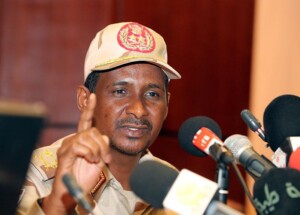US Ambassador Godfrey’s remarks on Sudan prompt sharp Russian retort
The first US Ambassador to Khartoum in 25 years, John Godfrey, denies that junta leader Gen Abdelfattah El Burhan’s participation in the 77th session of United Nations General Assembly signifies a new page in relations with the West and the USA, as Lt Gen El Taher Abu Haja, Media advisor to El Burhan and the Sudan Armed Forces, claimed during El Burhan’s visit to New York last weekend. Remarks by Godfrey in an interview regarding Sudan’s relations with Russia have met with sharp criticism from the Russian Embassy in Khartoum.
 US Ambassador to Sudan, John Godfrey (Photo: US.Gov)
US Ambassador to Sudan, John Godfrey (Photo: US.Gov)
The first US Ambassador to Khartoum in 25 years, John Godfrey, denies that junta leader Gen Abdelfattah El Burhan’s participation in the 77th session of United Nations General Assembly signifies a new page in relations with the West and the USA, as Lt Gen El Taher Abu Haja, Media advisor to El Burhan and the Sudan Armed Forces, claimed during El Burhan’s visit to New York last weekend. Remarks by Godfrey in an interview regarding Sudan’s relations with Russia have met with sharp criticism from the Russian Embassy in Khartoum.
In an interview with the Sudanese El Tayyar newspaper published yesterday, the new US Ambassador John Godfrey** said that he considers the Sudanese Bar Association’s initiative to develop a new constitutional charter “a serious proposal that enjoys credibility and the participation of various groups, which would help in the formation of a civilian-led government that is widely agreed upon”.
He renewed his call to the military government in Sudan to restore a civilian-led government and to put Sudan back on its transitional path, stressing a strong push to achieve this matter.
“There is a high sensitivity inside Sudan, concerning some people associated with the old regime who have been reinstated in the government, and that steps are underway to renew the exclusionary practices of the old regime, and this is what we neither support nor agree with.”
Godfrey further commented on Sudan’s agreement with Russia to establish a naval base in the Red Sea* and warned that if the Sudanese government moves forward with the military facility or to renegotiate about it, “it will be harmful to Sudan’s interests”.
Russia’s Embassy in Sudan released a statement via social media asserting that “the recently appointed Ambassador Godfrey, who has just arrived in Khartoum, decided to speculate on Russian-Sudanese relations, compensating his shallow knowledge of Sudan by relying on dubious ‘sources’ [their quotes – ED]. Apparently lacking experience as well as thoughtlessly repeating State Department undiplomatic approaches, J Godfrey, like his predecessors is trying to speak to the Sudanese people in the language of threats and ultimatums regarding Khartoum’s implementation of its sovereign foreign policy… His arguments concerning the modern world order look absurd.”
In conclusion, “the Russia Embassy in Khartoum emphasises our country’s commitment to further develop bilateral cooperation with Sudan on the principles of mutual respect and equality, which, unfortunately, are constantly neglected by Washington. We would rather recommend that the American Ambassador should take this into consideration during his work in such a responsible position.”
* On December 9, 2020, the Russian Official Gazette published the text of an agreement between the two countries on the establishment of a supply and maintenance base for the Russian Navy on Sudan’s Red Sea coast, with the aim of “strengthening peace and security in the region”.
The agreement provides for the establishment of a facility capable of receiving nuclear-powered warships and accommodating 300 staff members.
This proposed base will be able to receive four warships at one time and will be used for maintenance and resupply operations for crew members of Russian ships, according to the agreement.
The Sudanese Naval Forces received a visiting Russian frigate which docked in Port Sudan in March 2021. The visit by the Russian naval vessel fell within the framework of progressing relations between Sudan and Russia, and boosting cooperation between the Sudanese Navy with its Russian counterpart.
** The US Senate confirmed John Godfrey as Ambassador Extraordinary and Plenipotentiary of the USA to Sudan in June. Sudan has been served by a deputy ambassador, making Godfrey the first fully ranked US ambassador to Sudan in 25 years.
The confirmation of Godfrey’s appointment coincided with a vote by the US Congress to overwhelmingly approve a draft resolution, condemning the October 25 military coup, and voicing support for the people of Sudan.
US-Sudan relations
After a distinct thaw in US-Sudan relations following the overthrow of the Al Bashir regime and a movement toward democratic transition, relations between Washington and Khartoum have been strained following the subsequent the military coup d’état of October 25 last year.
The USA suspended all aid to Sudan following the coup, staing that “the United States is pausing assistance from the $700 million in emergency assistance appropriations of Economic Support Funds for Sudan. Those funds were intended to support the country’s democratic transition as we evaluate the next step for Sudan programming.”
On May 11, the US Senate passed a draft resolution ”to condemn the military coup in Sudan and support the Sudanese people,” and the House of Commons also unanimously passed the non-binding resolution with a quick vote without any objections.
On March 23, the US Senate’s Foreign Relations Committee unanimously approved a draft resolution condemning the military coup in Sudan and calling on the US administration to impose sanctions on those responsible for the coup.
The draft resolution came two days after the US Treasury imposed sanctions on the paramilitary Central Reserve Forces (popularly called Abu Teira) that stand under the command of the police, in accordance with the Global Magnitsky Act*** on serious violations of human rights.
The Treasury listed the excessively violent repression of peaceful pro-democracy protests by the security forces as the main reason.
There have been wide calls for targeted US sanctions on the Chairman of Sudan’s Sovereignty Council Gen Abdelfattah El Burhan and deputy Chairman Mohamed ‘Hemeti’ Dagalo for their involvement in serious human rights abuses following the coup.
In March, the US Department of the Treasury’s Office of Foreign Assets Control (OFAC) announced sanctions on the Sudan Central Reserve Police (CRP, popularly known as Abu Tira) for serious human rights abuse yesterday. The Treasury listed the excessively violent repression of peaceful pro-democracy protests by the security forces as the main reason.
The US Department of the Treasury’s Office of Foreign Assets Control (OFAC) announced sanctions against ‘Sudan companies with links to Hamas‘, with one financier, Hisham Younis Yahia Qafisheh, allegedly “operating and managing at least two Sudan-based companies, Agrogate Holding and Al Rowad Real Estate Development, in order to generate revenue for the Palestinian group.”
Bilateral agreement
In November 2020, Sudan and the USA signed a bilateral claims settlement to resolve “default judgements and claims based on allegations that Sudan’s prior regime supported acts of terrorism”. According to the agreement, Sudan had to pay $335 million, on top of approximately $72 million already paid, for distribution to victims of terrorism.
Sudan’s removal from the SST list, decreed in the dying days of the Donald Trump administration, was conditional on a bilateral claims settlement signed in November 2020 to resolve “default judgements and claims based on allegations that Sudan’s prior regime supported acts of terrorism”. Sudan had to pay $335 million, on top of approximately $72 million already paid, for distribution to victims of terrorism.
In exchange, after payment of compensation to the families of the victims of the bombing of the destroyer USS Cole in Yemen in 2000, and the 1998 bombing of the US embassies in Dar El Salaam in Tanzania and Nairobi in Kenya, the default judgments and claims against Sudan in US courts would be dismissed, and Sudan’s sovereign immunities under US law would be restored to those enjoyed by countries that have never been designated by the US as a State Sponsor of Terrorism (SST).
*** The Global Magnitsky Act of 2016 authorises the US government to sanction foreign government officials worldwide who are deemed to be human rights offenders. Sanctions can include freezing their assets and banning them from entering the USA.











 and then
and then